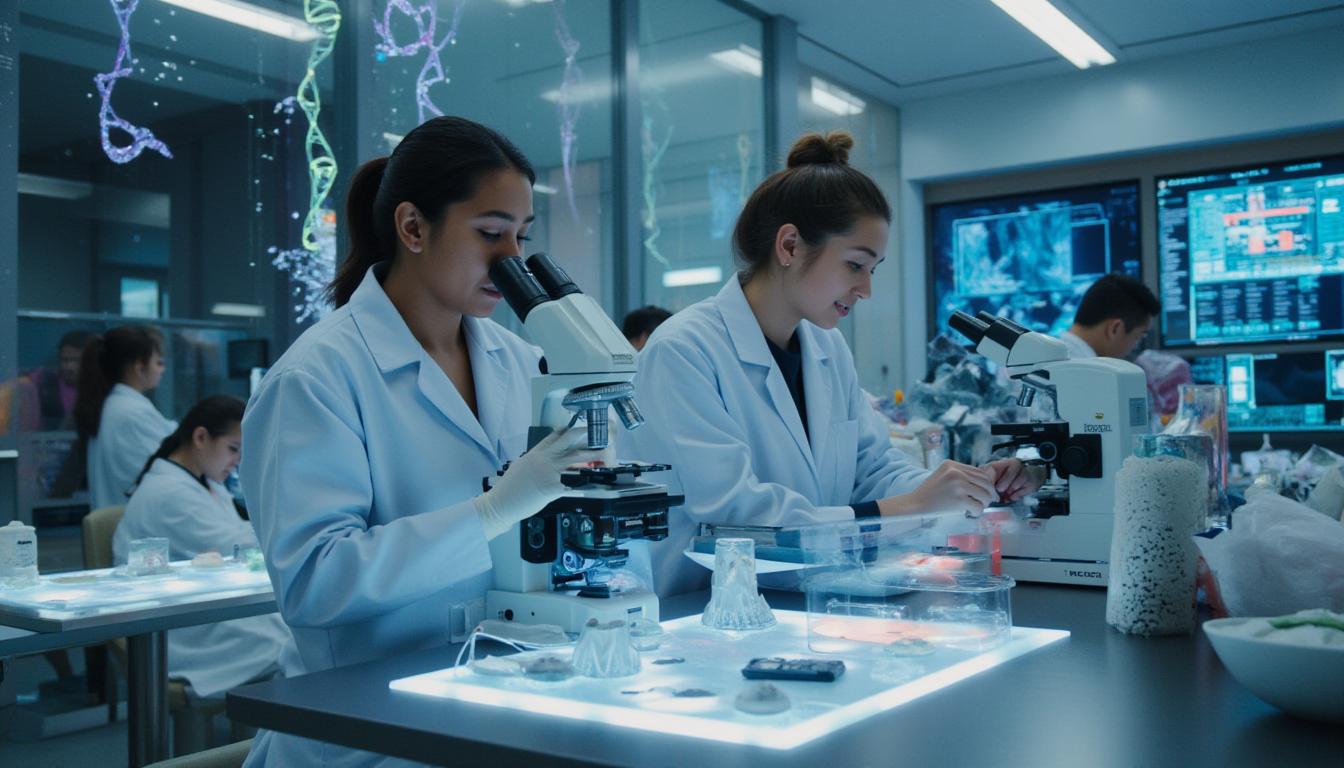
Choosing a specialized engineering field can be overwhelming, especially when options like Biotechnology Engineering Programs and Biomedical Engineering sound similar. Although both deal with biology and technology, they differ significantly in focus, curriculum, career scope, and industry applications. This blog, powered by provides an in-depth comparison to help you make the best academic and career choice.
Table of Contents
- Introduction
- What is Biotechnology Engineering?
- What is Biomedical Engineering?
- Core Differences: Biotechnology vs. Biomedical Engineering
- Curriculum Comparison
- Skills Required
- Career Opportunities
- Top Recruiters
- Industry Applications
- Future Scope and Research
- Which One Should You Choose?
- Why Choose MCSGOC for Biotechnology Engineering Programs?
- Student Testimonials
- Conclusion
- FAQs (15)
1. Introduction
In an age where science, technology, and healthcare are deeply interconnected, engineering branches like biotechnology and biomedical engineering are at the forefront of innovation. While both disciplines intersect with biology, their applications, training, and career opportunities diverge.
This comprehensive guide is tailored for aspiring engineers looking to understand the difference between Biotechnology Engineering Programs and Biomedical Engineering, especially students evaluating options at top colleges like MCSGOC in Lucknow.
2. What is Biotechnology Engineering?
Biotechnology Engineering is a multidisciplinary branch of science that combines biological sciences with engineering technologies to manipulate living organisms. Its primary objective is to develop products and technologies for agriculture, pharmaceuticals, food, and environmental conservation.
Key Domains:
- Genetic Engineering
- Molecular Biology
- Bioprocess Engineering
- Agricultural Biotechnology
- Microbial Technology
Biotechnology is used to enhance crop yields, develop vaccines, purify water, and much more. It focuses on using living cells and biomolecules for industrial and commercial applications.
3. What is Biomedical Engineering?
Biomedical Engineering, on the other hand, applies engineering principles to the medical field. It focuses on designing and developing medical equipment, prosthetics, diagnostic devices, and healthcare systems.
Key Domains:
- Biomechanics
- Medical Imaging
- Bioinstrumentation
- Rehabilitation Engineering
- Tissue Engineering
Biomedical engineers work closely with doctors and healthcare providers to create innovative healthcare solutions.
4. Core Differences: Biotechnology vs. Biomedical Engineering
| Feature | Biotechnology Engineering | Biomedical Engineering |
|---|---|---|
| Focus | Biological processes & organisms | Medical technologies & systems |
| Industries | Agriculture, food, pharma | Hospitals, device manufacturers |
| Applications | Vaccines, biofuels, GM crops | MRI machines, prosthetics, pacemakers |
| Lab Work | More biology-focused | More device-focused |
| Regulatory Focus | Biosafety & FDA | Medical compliance & FDA |
5. Curriculum Comparison
Biotechnology Engineering Programs:
- Microbiology
- Genetic Engineering
- Biochemistry
- Enzyme Technology
- Bioprocess Engineering
- Industrial Biotechnology
Biomedical Engineering:
- Human Anatomy & Physiology
- Biomedical Signal Processing
- Medical Imaging
- Biomaterials
- Instrumentation
- Rehabilitation Devices
MCSGOC provides a cutting-edge curriculum designed in collaboration with industry experts for both fields.
6. Skills Required
Biotechnology Engineers:
- Research Aptitude
- Laboratory Precision
- Molecular Biology Expertise
- Data Analysis
- Communication & Documentation
Biomedical Engineers:
- Problem-solving
- Hardware & Software Design
- Medical Device Regulations
- Electronics Knowledge
- Programming Skills
Soft skills like teamwork, ethics, and communication are crucial in both fields.
7. Career Opportunities
After Biotechnology Engineering:
- Biotechnologist
- Clinical Researcher
- Genetic Engineer
- Microbiologist
- Bioprocess Engineer
- Pharmaceutical Analyst
After Biomedical Engineering:
- Biomedical Equipment Technician
- Clinical Engineer
- Rehabilitation Engineer
- Medical Imaging Specialist
- Research Scientist in Medical Devices
MCSGOC alumni have secured positions in leading MNCs and research labs globally.
8. Top Recruiters
For Biotechnology:
- Biocon
- Serum Institute of India
- Novozymes
- Bharat Biotech
- Nestle
- Cipla
For Biomedical:
- GE Healthcare
- Philips
- Siemens Healthineers
- Johnson & Johnson
- Medtronic
- Dräger
MCSGOC hosts top recruiters on-campus every year during placement drives.
9. Industry Applications
Biotechnology Engineering:
- Vaccine production
- Bioremediation
- Agricultural enhancement
- Biofuel development
- Genetically modified crops
Biomedical Engineering:
- Diagnostic imaging systems
- Surgical robots
- Prosthetics
- Implantable medical devices
- Hospital IT systems
Both fields offer vast scope in research and application.
10. Future Scope and Research
With the rise of AI, IoT, and data science, both fields are evolving.
- Biotechnology is integrating with genomics, AI-based drug discovery, and CRISPR technologies.
- Biomedical Engineering is moving towards robot-assisted surgery, wearable devices, and regenerative medicine.
Biotechnology Engineering Programs at MCSGOC provide training in these futuristic domains.
11. Which One Should You Choose?
Ask yourself:
- Do you love microbiology and genetic research? → Choose Biotechnology Engineering.
- Do you want to design medical devices and work in healthcare tech? → Choose Biomedical Engineering.
Both offer immense potential; the choice depends on your interest and career aspirations.
12. Why Choose MCSGOC for Biotechnology Engineering Programs?
MCSGOC (Maharana Pratap Group of Colleges) stands out due to:
- AICTE and AKTU Affiliation
- Experienced faculty & industry mentors
- Hands-on training labs
- International MOUs & collaborations
- Top-notch placements
- Affordable fees for middle-class students
MCSGOC’s Biotechnology Engineering Programs are tailored for future-ready professionals.
13. Student Testimonials
“The Biotechnology Engineering program at MCSGOC helped me land a role at Biocon. The faculty was supportive and research-focused.”
— Priya Sharma, Batch of 2023
“Biomedical labs at MCSGOC are state-of-the-art. I gained hands-on experience in medical device development.”
— Rohit Mishra, Biomedical Engineering, 2022
14. Conclusion
In summary, Biotechnology Engineering Programs and Biomedical Engineering may share biological roots, but their paths and destinations are different. Biotechnology focuses on organisms and processes, while biomedical engineering targets the development of healthcare technology.
Choosing between the two requires a clear understanding of your interests and long-term goals. If you’re looking for quality education in either field, MCSGOC in Lucknow is among the best places to begin your journey.
15. FAQs (15)
1. What is the main difference between biotechnology and biomedical engineering?
Biotechnology focuses on biological systems; biomedical engineering emphasizes medical devices and technology.
2. Which program is more research-intensive?
Biotechnology tends to be more research-focused, especially in genetics and microbiology.
3. Are Biotechnology Engineering Programs good for pharma jobs?
Yes, they are ideal for roles in pharmaceutical companies and drug development.
4. What industries hire biomedical engineers?
Hospitals, device manufacturers, and healthcare tech companies hire biomedical engineers.
5. Which field has more government job opportunities?
Biotechnology offers opportunities in government research labs, agriculture departments, and health sectors.
6. Can a biomedical engineer work in biotechnology firms?
With additional training, yes, especially in device-related roles in biotechnological applications.
7. Are both courses available at MCSGOC?
Yes, MCSGOC offers both programs with excellent academic and placement support.
8. Which is more suitable for medical school later?
Biomedical engineering aligns more with pre-med requirements.
9. What is the average salary after biotechnology engineering?
Freshers may earn ₹3–6 LPA depending on skills and location.
10. Do biotechnology engineers work in hospitals?
Not usually, they work more in labs, pharma, and industrial sectors.
11. Is coding required in biomedical engineering?
Basic programming is beneficial, especially in imaging and instrumentation.
12. What kind of internships are available for biotech students?
Students intern at research labs, biotech firms, and pharmaceutical companies.
13. How long is the course duration at MCSGOC?
Both are 4-year undergraduate B.Tech programs.
14. Are there startup opportunities in these fields?
Absolutely. Biotech startups and med-tech innovations are booming sectors.
15. How to apply to MCSGOC?
Visit MCSGOC’s official website or contact their admission cell for detailed guidance.


